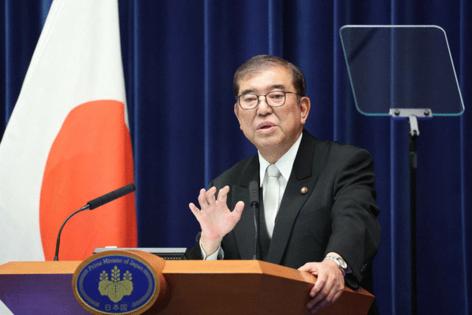Japan's Ishiba wins runoff vote to stay as PM ahead of likely Trump meeting
Published in News & Features
Japan’s Prime Minister Shigeru Ishiba received some rare good news as parliament backed him to stay in the job ahead of an expected high-stakes meeting with U.S. President-elect Donald Trump.
With the vote, Ishiba managed to avoid becoming Japan’s shortest-serving postwar premier. He will now be looking to shore up his leadership by putting together an economic stimulus package that meets some of the demands from those within and outside the ruling Liberal Democratic Party who could destabilize his minority government.
Meanwhile, Japanese officials are trying to arrange a meeting between Ishiba and Trump after the prime minister attends a meeting of the Asia-Pacific Economic Cooperation forum in Peru and then a Group of 20 leaders’ summit in Brazil early next week. The meeting might come during a stopover in the U.S. before Ishiba returns to Japan.
Late Prime Minister Shinzo Abe flew to New York from South America in November 2016 soon after Trump was first elected, and the two struck up a warm relationship. Many in Japan credit that personal bond for relatively smooth U.S.-Japan relations while Trump was president.
Ishiba and Trump spoke by phone last week, a conversation that Ishiba called “extremely friendly.” When the two leaders meet in person, it’s sure to be closely scrutinized by those in the LDP who might want to replace him, said Tobias Harris, founder of Japan Foresight LLC.
“Ishiba is not an experienced diplomat and bridge builder with foreign leaders,” Harris said.
Ishiba’s precarious position was illustrated on Monday when he became the first leader in 30 years to need a run-off to be selected as prime minister. Divisions among opposition parties helped Ishiba secure the most votes in the final count, defeating main opposition party leader Yoshihiko Noda.
The vote came after Ishiba’s LDP and its coalition partner Komeito lost their majority in the lower house of parliament in the Oct. 27 election, their worst result since 2009.
Even as premier, Ishiba will need backing from some in the opposition to pass major legislation, including an extra budget to fund an economic stimulus package. Ishiba has said the budget will top ¥13 trillion ($85 billion).
The support package is largely meant to tackle higher costs of living — particularly imported food and fuel — a problem that is likely to be exacerbated by renewed yen weakness against in the dollar after Trump’s victory.
The package will feature cash handouts to help low-income households deal with inflation and extra funding for disaster preparedness, according to public broadcaster NHK.
The most likely source of support will come from the Democratic Party for the People, a small party relatively close to the LDP on the political spectrum that has enough seats in parliament to help the coalition pass legislation.
The DPP’s main demand is to raise the ceiling of tax-free incomes from ¥1.03 million to ¥1.78 million. Talks are ongoing between the LDP and DPP over the proposal, but DPP leader Yuichiro Tamaki faced his own setback on Monday, after he acknowledged as “largely true” magazine reports alleging marital infidelity. He remains party leader.
Following his re-election as prime minister, Ishiba lined up three new cabinet members as he seeks to re-set his administration just six weeks after he made the surprise leap from LDP party sidelines to national leader.
Still, his failed gamble of calling a snap election doesn’t bode well for his longevity as prime minister.
Concessions that Ishiba will have to make to opposition parties to manage a minority government could amplify calls to replace him within the LDP, said Masaki Taniguchi, a professor of political science at the University of Tokyo.
The LDP faces another national election next July for the upper house of parliament, and some analysts see the passage of the national budget next spring as a potential watershed moment that could lead to a change at the top.
“It’s possible that there will be calls within the LDP for a change of prime minister after the annual budget proposal is approved,” Taniguchi said.
Harris of Japan Foresight said one party heavyweight who could benefit is former LDP secretary-general Toshimitsu Motegi, who portrayed himself as an effective negotiator with the Trump administration in his recent bid to be party leader. Motegi played a leading role in talks with the U.S. over a trade deal reached in 2019.
In an interview with Bloomberg Businessweek in June, Trump renewed his criticism of the yen’s weakness against the dollar and the advantage it gives Japanese companies such as automakers.
Trump has also called for Japan to pay more for the U.S. military presence of around 55,000 troops, the largest permanent foreign deployment of American forces. The current deal is up for renewal in 2026.
-------
With assistance from Yuko Takeo.
___
©2024 Bloomberg L.P. Visit bloomberg.com. Distributed by Tribune Content Agency, LLC.







Comments